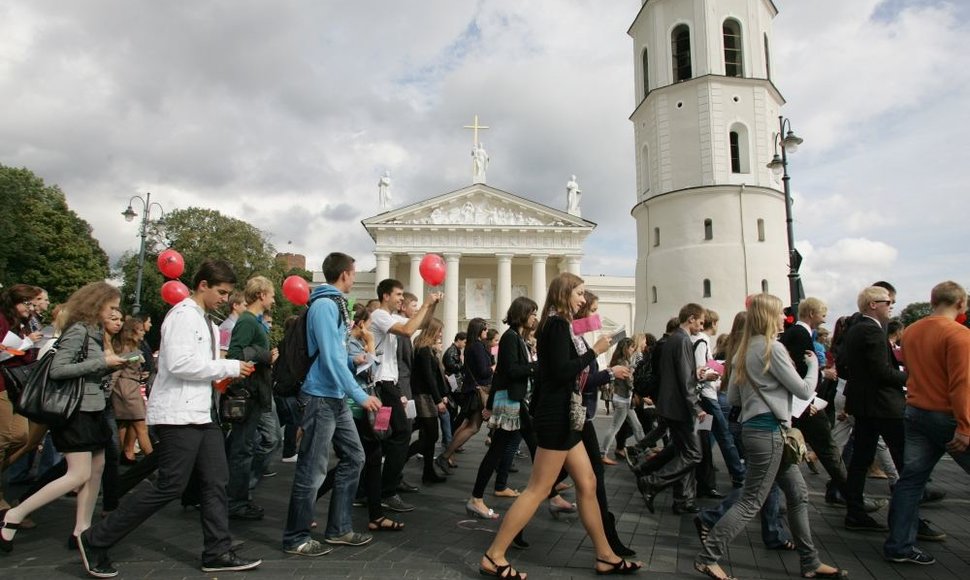World Lithuanian Youth Congress in July is to be attended by around 3 thousand people from 27 countries. Many of them were not born in Lithuania. The high attendance is a credit to the World Lithuanian Youth Association (WLYA) and its efforts – for comparison, World Lithuanian Economic Forum in July 2009 was only attended by hundreds.
Lithuania should be more than interested and give an open-arm welcome to educated young people with valuable experience. Why, on the other hand, should the country's wellbeing be of any interest to those who were not born in Lithuania or left it early in their childhood?
Not deterred
WLYA committed itself to Sisyphean task of getting the youth to “come back to Lithuania for at least a short while.” They wrote emails, made phone calls, contacted Lithuanian youth associations in 30 countries. Ambassadors of the event are still adding new names to the participant list while spreading the word about World Lithuanian Youth Congress 2012.
 |
| Nuotr. iš asmeninio albumo/Ray Bartkus |
Ray Bartkus, known artists and one of the most popular US illustrators, is one of them. He says that expat youth view Lithuania favourably, so the main question is how welcoming Lithuania is. “I've spoken to 17-27-year-olds that are studying or have just graduated from various world-famous schools and universities. I was interested in how these people relate to the land of their forefathers, if they would like to come to live in Lithuania. They've all been born in the US, in Lithuanian families, or in Lithuania, but started school in the US. Even though the number of people I've polled is not big, I can draw certain conclusions.”
Bartkus himself has been living in New York for over 20 years. In his view, if a child started school and graduated in the US, he or she is culturally an American, irrespective of his or her family roots.
The WLYA ambassador also polled people who started school in Lithuania, but moved to the US in their teens – the results were somewhat different.
That means, Bartkus concludes, that their experience in Lithuania leads to different stereotypes of thought. Besides, these people – much like Bartkus himself – are still balancing between Lithuania and the US. “I think that Lithuania could make great use of the experience of young people who were born and grew up as Americans. Their worldviews are distinct from Lithuanian mentality and could potentially open up new choices.”
Bartkus says he has asked young Lithuanian-Americans to list five words they think best describe Lithuania – and came up with a rough, yet honest picture of how they imagine the country.
“Only one respondent left this field conspicuously blank. Others put: motherland, green, small, unique, proud, beautiful, rich history, intriguing, undervalued, calm, stuck in time, arrogant, patriotic, divided, dark, full of negativity, hopeless, with potential, lively, much nature, too much drinking, renewing, basketball-loving, free, stubborn, culturally rich, developing, and, of course, fun,” Bartkus says.
He said that the last epithet – fun – is very American. So the range is wide and heterogeneous, testifying to a rather three-dimensional image of Lithuania in their heads.
“I also asked weather they'd agree to come to Lithuania for a few years to work in business, academia, or do their own projects. As many as 80 percent said they viewed the prospect of pursuing career in Lithuania positively. Others wouldn't go, as they could not apply their professional skills in Lithuania. There was only one who gave a definite no.”
American example
According to Bartkus, this shows good faith – and if the state leaders are not merely engaging in short-term campaigning when they say they want to attract emigrant youth, then the results should bring their optimism up.
One of his respondents, college student Dovas Bukauskas, writes: “Let's improve the state apparatus so that government officials are obliged to do a fair and efficient job. Words are already turning into deeds, but still not as fast as one would like.”
Bartkus hopes that the congress participants will demand of politicians to make decisions, encouraging emigrant youth to come to Lithuania and contribute to its development with their experience and expertise.
On the other hand, why should they care?
“Granted, these young people do not owe anything to Lithuania. They were born, grew up, and were educated in America. It is a country where university education is expensive and represents great investment on their and their parents' part, often made on credit that will have to be paid back. This factor also plays a part in their decision. Let's face it – it's hard for them to expect any tangible financial benefits from working in Lithuania. Besides, brightest students from best universities are being recruited by best-known American and international companies. It's difficult for Lithuania, with its tiny market, to work with them,” Bartkus says.
And yet, according to him, it is possible to come up with a mutually-beneficial cooperation scheme: “They should reach out to teenagers, maybe even younger people. I've met many youngsters from Lithuania here, in New York. They come to the US to do seasonal summer jobs. It's a program funded by the US State Department, allowing kids from all over the world to come and get to know America, their American peers, and it also helps businesses that need extra hands during high season. I haven't heard of anything alike in Lithuania. Once you establish a connection with teenagers, you can then strengthen it through universities or business companies, by holding idea incubators, sharing relevant legal and business information. That would create a creative, open, and tolerant environment, attractive to young and talented people, and not necessarily of Lithuanian origin.”
Opening up is crucial
Almost everyone in Bartkus poll mentioned the word “internship.”
The following is an extract from a response by a college student, Simon Glinskis: “Lithuanians do not get the point of internships. The Lithuanian government should assist various industries by subsidizing internship programs. That would be beneficial for both students and employers. I think that internships that US Lithuanians could do while exploring Lithuania is not only a way of introducing them to the land of their forefathers, but also great practical experience in the growing global society.”
US schools and universities often have compulsory programs of work and study abroad. Mr Bartkus' son, while still in high-school, spent one summer in France and another in the UK, working in an archaeological site. While at Harvard, he spent all his summers in India, Mexico, and Argentina, working in microfinance.
Bartkus says that all the young people he interviewed are worthy bright individuals and could make invaluable contribution to Lithuania's development. In recent years, he has met many bright people from Lithuania who come to the US to build a future for themselves.
“Reasons driving young people from Lithuania are very similar to those preventing emigrant youth from returning. Lithuania will manage to attract youth only if it opens itself up to the world, or, as one of the students I polled, Gabija Blaudžiūnas, puts it, if it makes links. That requires a tolerant cultural and business environment, flexible policies, and transparent implementation mechanisms. None of the youths I interviewed demanded any exceptional conditions or benefit, as every one of them can prosper in any country of the world,” Bartkus says.
Austėja Vidugirtyė, economics major, has also listed her suggestions to Lithuanian authorities: “Make better conditions for people who do not speak the language to set up business. [...] Together with world's universities, make more programs encouraging students to study or work abroad. Hold various cultural events, revealing more than just historical aspects of Lithuania. Create new, groundbreaking businesses that could attract young people, give them more opportunity.”
Short on opportunities, not people
According to Darius Udrys, European Humanities University vice rector for development and international relations who grew up in the US but now lives in Vilnius, Lithuania will not prosper until it creates more opportunities for bright and creative people to do meaningful work. That must be borne in mind while discussing issues crucial to business and social activity, like tax policy, education, business and NGO development, employee-employer relationship, healthcare, etc.
In each case, Udrys says, we should ask ourselves weather we settle these issues in a way that
 |
| Asmeninio archyvo/vakarai.us nuotr./Darius Udrys |
makes Lithuania more attractive and inviting to bright and creative people. Or if it, on the contrary, reduces opportunity – for the sake of whatever alternative causes that are unlikely to get achieved anyway, if we loose the most creative people.
“If we want to attract people, we must encourage and stimulate their positive emotions. I don't think that anyone reflecting on “Lithuania” does that in an abstract manner. Conscious people think about how they can use their talents to the fullest and get duly rewarded. Not everyone is meant to do it in Lithuania,” Udrys says.
Kęstas Pikūnas, president of the World Lithuanian Youth Association, speculates that a young person concerned with future always chooses the kind of environment that is most likely to provide maximum opportunity for self-fulfillment and getting highest return. It might be called youthful maximalism and taste for new experience, career, seeing the world and learning things: “I don't think it's wrong to ask: What's in it for me? It is more important to realize that we can create added value for ourselves and Lithuania together.”
Everyone wants, he says, to see Lithuania successful and thriving, but is there any room for a young person to make a difference? Many doubt that – when it comes to infusing the system with
 |
| R.Boitsovos / lietuviams.com nuotr./Kęstas Pikūnas |
young and well-traveled minds, there's often a strong reaction from the post-soviet mentality and bureaucracy, preventing from any significant changes.
“Lithuania is in our genes and it will always be a motherland and a dear country. There's no question about that, as it is equally important to everyone, though in different ways,” Pikūnas is certain.
Besides, freedom of movement now lets young people come back to Lithuania quite often. They maintain close ties with Lithuania, with friends who live here and their families. Emotional connection remains, according to Pikūnas, even though attitudes may change. Many who leave immerse themselves into their studies and careers and observe events in Lithuania from outside.
“It would be naïve to assume that a young person sits down in the evening and thinks – what is there that I can give to Lithuania? I'm not saying that doesn't happen, but that should come naturally, in an unforced and timely manner. One can speed it up only be showing opportunities and working together,” Pikūnas thinks.
A good start, he says, would be specific examples and joint projects, showing young people who live abroad how they can contribute to the country's wellbeing – as this would create the sense of communality, dialogue, and willingness to work together. Most important, according to Pikūnas, is making young people see that they can indeed contribute towards a better Lithuania and that they are part of it, despite living elsewhere.
New generation
Experience shows that everyone can work towards Lithuania's prosperity, even though not all can or try to see how and why they should.
“Those who've left have nice memories, but many feel sad not seeing a place for themselves in their own country. The sadness also contains some anger – why is their country so unwelcoming to them?” L.A. Lithuanian community leader Udrys agrees. One often goes too far in considering this issue, leading to claims that there's absolutely nothing good in Lithuania, no hope that things might be better.
“Certainly, we have many lingering problems that could have long been solved by more responsible and competent leaders, like in the neighbouring countries. On the other hand, the new generation and particularly those people who know that it can get better refuse to accept the existing situation and great inequality among people, if all that stands in the way of making progress and using limited resources efficiently are nepotism and the rule of mediocrity,” Udrys, political scientist, says.
World Lithuanians are waiting for a signal that things are changing – and the signal comes in the form of a young generation with higher standards and greater expectations. But will the few progressive minds that still remain in Lithuania suffice to make the change happen?












